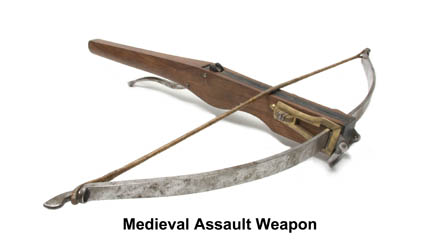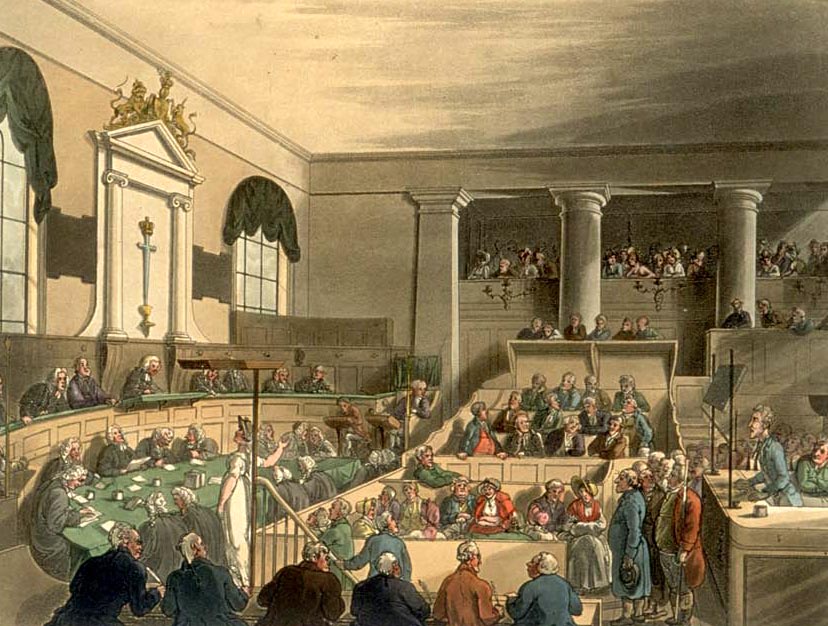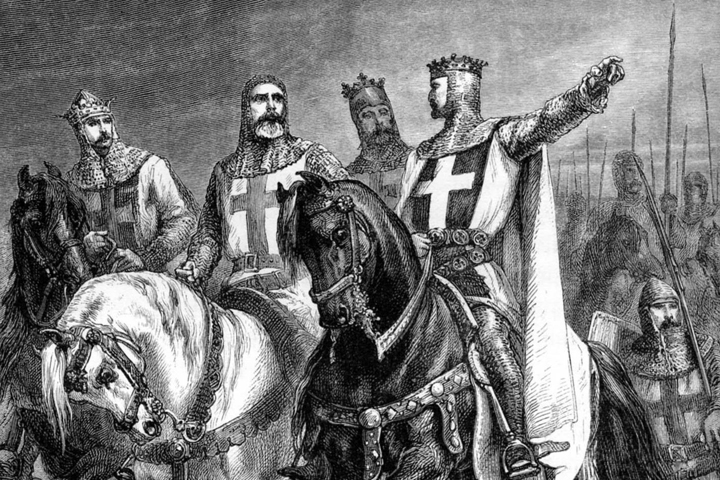

The mystique and the arcana of weaponry goes back to Man's earliest beginnings as a separate species. The very fact that we develop and use weapons is one of the things that makes us human in the first place. Other species use and even  fabricate tools: but no other has developed a special sub-class of tools that are specifically designated as weapons by their makers. One can argue whether this is good or bad, but the undeniable truth is that one definition of “humans” could be "the animal that makes and uses weapons," and it will always be so.
fabricate tools: but no other has developed a special sub-class of tools that are specifically designated as weapons by their makers. One can argue whether this is good or bad, but the undeniable truth is that one definition of “humans” could be "the animal that makes and uses weapons," and it will always be so.
Weaponry and its rituals are completely woven into the fabric of mankind at all levels. The very oldest examples of human art and creative endeavor are cave paintings of hunting scenes, in which weapons and the power they give over prey are depicted. In the mythology of the ancients, many gods are depicted holding spears, swords, war hammers, or tridents: again as symbols of might. King Arthur had his famous sword, Excalibur; St George slew a dragon with his. Knights rescued fair maidens in distress and fought for honor with lances and broadswords. Even today there is hardly a TV show or motion picture to be found in which some form of weapon isn’t present.
It follows from this understanding of the inherent importance of weapons to humans that societies at every level of development have also evolved codes of ethics, honor, and behavior that center around their possession and use. From Stone Age tribes to western European cities, there have always been generally-understood principles about who may and who may not have  weapons; about how and when they may be used; and about what is and what is not a “proper” weapon for someone to have. In some cultures—for example, in many Native American tribes—the mystical property that gave a weapon its power would be lost if it were handled by someone deemed unworthy. In modern America a weapon with a connection to specific individual—good or bad—takes on a resonance not associated with similar guns: Sergeant York’s rifle or Al Capone’s revolver were pretty unremarkable in and of themselves, but have cachet thanks to their semi-mystic associations with their original owners’ deeds.
weapons; about how and when they may be used; and about what is and what is not a “proper” weapon for someone to have. In some cultures—for example, in many Native American tribes—the mystical property that gave a weapon its power would be lost if it were handled by someone deemed unworthy. In modern America a weapon with a connection to specific individual—good or bad—takes on a resonance not associated with similar guns: Sergeant York’s rifle or Al Capone’s revolver were pretty unremarkable in and of themselves, but have cachet thanks to their semi-mystic associations with their original owners’ deeds.
In virtually every society the definition of who is and who is not an “honorable” and “decent” person is often couched in terms of his status with respect to weapons. In some Western nations the ownership of weapons is restricted to those in power, those of noble birth, or those in the favor of the ruling elite. Because individuals who met these criteria historically were expected to defend their liege and his holdings, one defining characteristic of a “gentleman” has always been skill at arms.
Even in the relatively egalitarian USA, this principle holds: only “good” people are to be trusted with weapons. States with restrictive gun laws often mandate that the issuance of license to carry or even to just own a weapon be restricted to individuals of “good character”; hence if someone is so licensed he is automatically trustworthy. Even where ownership of weapons is a right, not a privilege, transgressing certain standards of behavior nullifies the right because the transgressor is demoted in status and prohibited from owning weapons.
 The Founding Fathers understood the dichotomy that a well-armed population represents: on the one hand it means that individuals are prepared to defend themselves and their nation against attack; on the other it presents the risk that bad actors may employ weapons in bad ways. Nevertheless, as individuals who had been pulled from their beds in the middle of the night by armed goons acting on behalf of the King, the Founders understood the need for the pre-existing “right of the people to keep and bear arms” (which has its roots deep in English law and history, long predating the American Revolution) and protected it with the wording of the Second Amendment.
The Founding Fathers understood the dichotomy that a well-armed population represents: on the one hand it means that individuals are prepared to defend themselves and their nation against attack; on the other it presents the risk that bad actors may employ weapons in bad ways. Nevertheless, as individuals who had been pulled from their beds in the middle of the night by armed goons acting on behalf of the King, the Founders understood the need for the pre-existing “right of the people to keep and bear arms” (which has its roots deep in English law and history, long predating the American Revolution) and protected it with the wording of the Second Amendment.
So as the horizon of my life gets nearer, I understand more fully that ownership and use of weapons is one of the things that defines me not only as human, but as a fully participating citizen in the society in which I live. It’s a vital and meaningful piece of who and what I am, and I am increasing less inclined to tolerate infringements on that part of my persona and my life.
In the United States today we are engaged in a 75-year-old debate over who does and does not have the “…right to keep and bear arms…” It’s important to understand that the excesses and the viciousness of the anti-gun zealots also have their roots deep in the human psyche and in ancient codes of legal and moral behavior. And—probably also without realizing it—their idea that only people who can be “trusted” should own weapons is in fact anchored in religious and legal doctrines of which most of us have never heard. We must not allow ourselves to be sidetracked by their bogus claims of “safety” and “crime prevention” but we must also accept their sincerity, even while we abhor the true motives of their leadership.
It’s an interesting fact that nearly all of our most rabid enemies have classified themselves as worthy to own weapons, while at the same time claiming that general ownership is a risk to society in general. They take the concept of “gentility” (and its concomitant societal permission to be armed) to its logical conclusion. Thinking they are the ones who decide who can be trusted, they have no qualms about owning weapons themselves; rich or famous people, politicians and those in favor as celebrities get a “pass” in restrictive jurisdictions, especially when those people hold ideas that are pleasing to the ones in power. One of the most outspoken enemies of gun ownership, a Senator from California, is known to hold a concealed carry permit that ordinary citizens of her state cannot get; a few very rich residents of New York City (a jurisdiction that denies virtually all applications for permits to possess handguns, and which strictly regulates long guns) routinely get permits that are denied to others. The District of Columbia is fighting tooth and nail to avoid having to obey the injunctions of the Supreme Court, as is Chicago.
The anti-gunners are a lot of things and their leadership is dishonest; but they aren’t stupid. They can understand statistics as well as anyone else. They know that in places where restrictions exist, crime is high, and where restrictions are few, crime is low. They understand that the right to keep and bear arms is an individual one, a right that pre-existed and is protected by the Constitution. They clearly realize that “crime” is a bogus argument, and that infringing on the liberties of citizens only makes society more dangerous. They don’t care.
While they may or may not accept the notion that weapons are part of what makes us human, they do fully understand that “gun control” isn’t about guns, it’s about control: who has it, and who gets to keep it. It is impossible to compel armed citizens to submit to injustices, as King George III found out, and as every dictator in history has also known. By disarming the general populace and allowing only those they can “trust” to have the means to resist compulsion, they can proceed with other agendas. They understand that the Second Amendment is the “enforcement clause” of the Bill of Rights, and that without its protections the rest of the rights it protects are meaningless shams.
The leadership of the “gun control” movement will never admit this, and many of the rank-and-file of our enemies are genuinely sincere in their beliefs that weapons are bad things. But the leaders—who not incidentally are for the most part people who regard the Constitution as an impediment to their own goals—certainly are disingenuous about their real justifications for “gun control.” Simply put they want to bully everyone else into doing things their way. Before they can turn us into a nation of serfs, we have to be disarmed. Total, complete abolition of private ownership of weapons is their goal and nothing will deter them from pursuing it.
 One of the most powerful “levers” they have is the concept that weapons are, in and of themselves, “bad.” That idea that “guns cause crime” is arrant nonsense, but it resonates with many people. Why? The answer to this, I believe, lies in an ancient legal concept: that of the “deodand.”
One of the most powerful “levers” they have is the concept that weapons are, in and of themselves, “bad.” That idea that “guns cause crime” is arrant nonsense, but it resonates with many people. Why? The answer to this, I believe, lies in an ancient legal concept: that of the “deodand.”
The word “deodand” comes from Latin and literally it means “that which is to be given to God.” It has its misty origins in Church law, from a time when the Church was the only governmental entity worth considering. In Medieval legal codes, a deodand was any material object associated with the death of a human being. In this view, the deodand, be it a robber’s knife or a runaway ox cart, was itself “guilty” of the death and therefore was to be confiscated, sold, and the proceeds given to the Church. No one questioned the Church’s teachings on such points, or any others, in the Middle Ages. The deodand is an absurd concept to modern people—how can an inanimate object be “guilty” of anything?—but it is firmly rooted in western society’s view of the world.

The early civil legal codes which enshrined the deodand as part of the law were derived from Roman and Church legal precedents, and it was so natural a way of thinking to our ancestors that it persisted in English civil law well into the middle of the 19th Century. Even today traces of it remain in some US state codes, in the concept of “civil forfeiture.” Forfeiture of objects used in a crime—a poacher’s shotgun or truck, a drug dealer’s Mercedes, etc.—is common. The Federal government, states and even localities seize such things; if they aren’t “weapons” they often get sold to the public and the money returned to the civil government (which in modern times has taken the place of the Church). In the case of seized weapons, there is usually no attempt to return it to a rightful owner: as a “deodand” it becomes the property of the state. “Gun buy-back” programs are predicated on the same idea: any weapon is itself an evil thing that must be destroyed lest it kill.
Thus there is a concatenation of two very old and primitive ideas in the mind of the anti-gunners: first, that of weapons as a special class of objects with mystic properties (which they believe to be inherently evil); and second, the all-too-human urge to make others obey their will. Given the machinery and power of modern governments, it was inevitable that these ideas would become the foundation on which the “gun control movement” was built; and not incidentally one of the levers to bend and distort the Constitution beyond recognition. Their thinking is very plain, and very clear, although it is wholly wrong: “Weapons are bad; guns are weapons, therefore they are bad; we must remove weapons from society; therefore we must outlaw possession of guns except by those we trust.”
 This is in fact a religious viewpoint and “gun control” is a religious mission for them. They see themselves on a holy crusade to “protect” society. Nothing can dissuade them: not logic, not fact, not common sense. Like all other religious fanatics, advocates of “gun control” simply don’t hear anything that disagrees with their view of the world. I don’t doubt that the average rank-and-file anti-gunner is sincere in his or her beliefs. But like the simple peasant soldiers who fought in the Crusades and thought they were being sent to “liberate the Holy Land from the heathen,” they are deceived by cynics and charlatans who know how to manipulate honest people to maintain and increase their own power. Given the collusion of other major forces in our society (such as the media and the press) they have been immoderately successful in their campaign against our rights. I repeat: the leaders of the “gun control” movement know perfectly well that they are lying and deceiving their followers.
This is in fact a religious viewpoint and “gun control” is a religious mission for them. They see themselves on a holy crusade to “protect” society. Nothing can dissuade them: not logic, not fact, not common sense. Like all other religious fanatics, advocates of “gun control” simply don’t hear anything that disagrees with their view of the world. I don’t doubt that the average rank-and-file anti-gunner is sincere in his or her beliefs. But like the simple peasant soldiers who fought in the Crusades and thought they were being sent to “liberate the Holy Land from the heathen,” they are deceived by cynics and charlatans who know how to manipulate honest people to maintain and increase their own power. Given the collusion of other major forces in our society (such as the media and the press) they have been immoderately successful in their campaign against our rights. I repeat: the leaders of the “gun control” movement know perfectly well that they are lying and deceiving their followers.
I was born and grew up at a time in which weapon ownership was accepted without argument, but 50-plus years of propaganda and lies and distortions and double-talk have eroded the social acceptance of it to the point where it can no longer be taken for granted. Personally, I’m tired of being lied to; and I’m even more tired of lied ABOUT. I want to see my country and my society return to an understanding that I am trustworthy, and that the mark of that trustworthiness is my responsible, safe, and legal use of weapons of any kind. I want to go back to a time when it wasn’t a crime to give a kid a rifle and let him have fun with it so long as he didn’t hurt anyone else.

I want to live long enough to see guns and shooting sports return to what they used to be: the hallmarks of a free and responsible citizen who was not a threat to, and was therefore not threatened by, his government. If we gun owners stand together, if we don’t allow ourselves to be divided by arguments over “assault weapons” and “sniper rifles” and “fifty-caliber rifles” and suchlike trivia, if we don’t allow the “sporting purposes” argument to be admissible under any circumstances, if we insist on all states recognizing the Supreme Court’s findings in the Heller and MacDonald cases, that time may come.
As one of those Founders, Benjamin Franklin, remarked, “We must all hang together or we will most assuredly all hang separately.” In this time of crisis, all gun owners, all hunters, all collectors, and all respecters of the Constitution must hang together. If we don’t that day may never arrive. We have made progress since 1994, but there is much, much more to be done.
| HUNTING | GUNS | DOGS |
| FISHING & BOATING | TRIP REPORTS | MISCELLANEOUS ESSAYS |
| CONTRIBUTIONS FROM OTHER WRITERS|
| RECIPES |POLITICS |